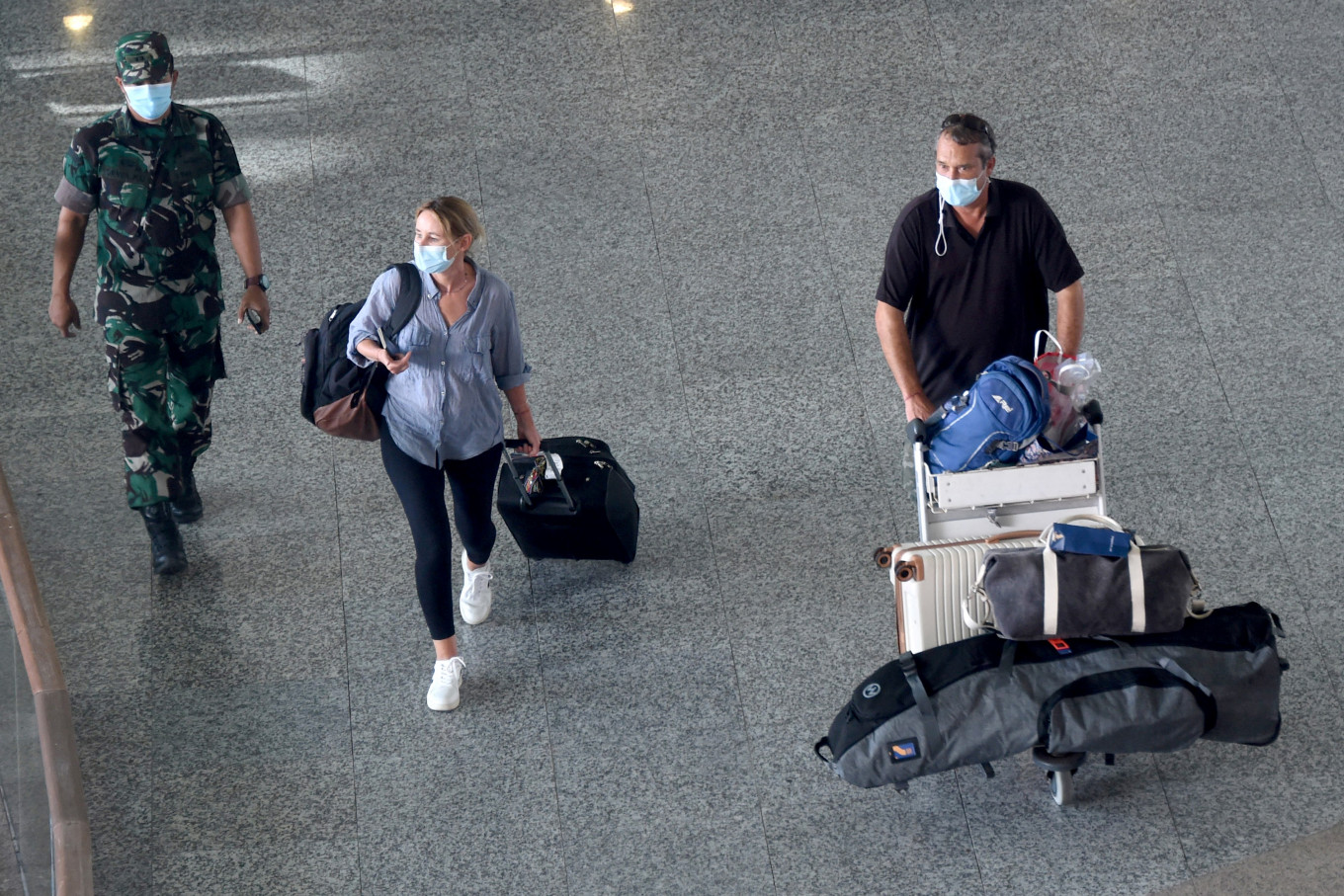Popular Reads
Top Results
Can't find what you're looking for?
View all search resultsPopular Reads
Top Results
Can't find what you're looking for?
View all search resultsGovt ends quarantine for foreign visitors to Bali
Policy expected to help revive tourism on the island.
Change text size
Gift Premium Articles
to Anyone
T
he government waived the mandatory quarantine for fully vaccinated international visitors to popular tourist destination Bali on Monday, as it seeks to loosen requirements in other parts of the country by April 1.
Tourism and Creative Economy Minister Sandiaga Salahuddin Uno announced the decision on Saturday, expressing the hope that the new policy would help revive Bali's tourism and create new economic opportunities for locals.
"It's official, as instructed by President Joko 'Jokowi' Widodo, Bali is launching a quarantine-free travel trial for international travelers who have been fully vaccinated or have received booster shots, starting on March 7," Sandiaga wrote on Instagram. "We're optimistic that [the new policy] will bring more job and business opportunities for residents."
Under the new entry rules, international visitors who wish to travel to Bali without quarantine must book at least a four-night stay at a local hotel and must take at least three PCR tests, one before departure, one upon arrival, and one on the third day of their visit.
Those who test positive for COVID-19 must isolate themselves in their hotel rooms until they test negative for the virus. However, elderly patients and those with comorbidities must be admitted to local hospitals.
The government initially planned to begin the quarantine-free travel scheme next week, but decided to implement it earlier following a request from Bali Governor I Wayan Koster.
Read also: Bali to trial quarantine-free international arrivals this month
Kurleni Ukar, deputy for strategic policy at the tourism ministry, said the government granted the request mainly due to low positivity rates among foreigners arriving in Bali and the province's high vaccination rate.
"Our latest data reveal that the COVID-19 positivity rate among foreigners visiting Bali is very low, at 0.47 percent for the entry test and 1 percent for the exit test," Kurleni said as reported by kompas.com. "Other tourism-driven countries have already dropped quarantine requirements despite recording higher positivity rates than us."
As per Monday, more than 100 percent of Bali's 3.4 million targeted population had been fully vaccinated and some 673,000 residents or 20 percent have received booster shots.
COVID-19 cases in Bali have been steadily declining since the peak of the Omicron-fueled surge on Feb. 8, when the province recorded 2,425 new daily cases. It reported 152 cases on Monday.
Reviving Bali
Indonesia has imposed some of the strictest entry procedures in Asia to try to contain the outbreak and keep new variants at bay, but the restrictions have greatly harmed its tourist sector.
The economic impact of the pandemic has been especially devastating in Bali, where tourism accounts for 54 percent of the economy. According to Statistics Indonesia, Bali attracted 6.2 million foreign visitors in 2019 but the number dropped to 1.05 million the following year.
The government decided to reopen Bali for international visitors from 19 countries in October of last year in the hope of spurring the resort island's economy. But the lack of direct international flights, strict travel requirements and long quarantine period of eight days deterred many tourists from visiting the island.
Read also: Bali welcomes back tourists with first international flight
Last month, the government finally reopened Bali to all international travelers, while also cutting down the length of the quarantine period to five days. Since then, some 1,600 international visitors have arrived, most of them coming from Russia, France, Australia, the United States and the Netherlands.
To further boost Bali's tourism, the government also resumed on Monday its visa-on-arrival policy for travelers from 23 countries, including the US, New Zealand, the United Kingdom, Italy, Germany and all Southeast Asian nations. It also revoked the obligation to have a sponsor for a tourist e-visa request.
Under the old rule, tourists had to find a sponsor for a visitor visa, which cost around Rp 3.5 million rupiah (US$329). The new visas will cost just Rp 500,000.
Bigger plan
Authorities said the quarantine-free policy in Bali would be evaluated each week in accordance with epidemiological indicators and would be expanded to other regions if successful.
“If the trial in Bali goes well, we will expand the no-quarantine policy [to other provinces] starting from April 1 or even earlier,” Coordinating Maritime Affairs and Investment Luhut Pandjaitan, who heads the government’s pandemic response in Java and Bali, said last week.
As part of a gradual shift toward eliminating quarantines for international arrivals in other parts of the country, the government on Monday further cut the quarantine period from three days to just one day.
Read also: Govt retracts ban on international tourist arrivals via Soekarno-Hatta
Epidemiologist Dicky Budiman of Griffith University in Australia urged the government to accelerate vaccination and the administration of booster shots to ensure the virus remains under control after the elimination of quarantine.
"It would be better if the government could fully vaccinate at least 90 percent of Indonesia's population and give booster shots to 50 percent of the targeted population, as well as strengthening COVID-19 surveillance before [enacting the quarantine-free scheme]," he said.
By Monday, the nationwide vaccination rate for the second dose stood at 71 percent while the rate for boosters stood at only 6.1 percent.
Also on Monday, the government lifted mandatory antigen or PCR testing for fully vaccinated domestic travelers, marking the first such move since it implemented the policy in July last year.










